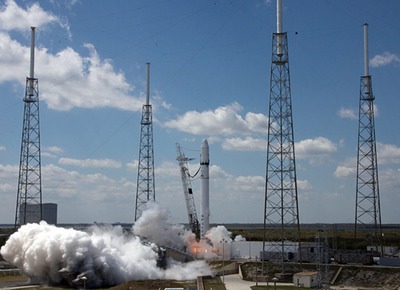
Falcon 9 on the pad at Cape Canaveral for a static test firing earlier this year.
If all goes as planned, SpaceX’s Falcon 9 rocket will lift off Friday from Cape Canaveral on a mission to demonstrate the capabilities of the new launch vehicle. However, the problem with new launch vehicles is that things often don’t go as planned, a concern not just for SpaceX but for the broader commercial spaceflight industry at a key time for it.
SpaceX CEO and CTO Elon Musk was well aware of the difficulties of launching new rockets, something he and SpaceX have already gone through with the smaller Falcon 1, which failed to reach orbit on its first three launches. “Historically, I think it might be something like a 50/50 shot of the first flight succeeeding,” he said in a teleconference with reporters Thursday, referring to the historical record of first launches of new rockets.
He does feel a little more optimistic about the chances of success with Falcon 9, citing the company’s experience and heritage of some Falcon 9 components on the Falcon 1. “My personal assessment of the likelihood of success is probably 70-80 percent,” he said. He did have a colorful way of putting that into perspective. “I should point out that this is less than the probability of success in Russian roulette,” he noted. (Assuming success in Russian roulette is defined as not getting a bullet, you have a 5 out of 6, or 83%, chance of getting an empty chamber.) “So if anybody remembers that scene from The Deer Hunter, that’s tomorrow.”
Well, that’s one way to look at it. It’s also worth noting that success is not a binary condition for this test flight: there’s a spectrum of outcomes between complete success and complete failure. “One hundred percent success would be reaching orbit” with the model of the Dragon spacecraft the rocket is carrying, Musk said. “But I think that, given that this is a test flight, whatever percentage of getting to orbit we achieve would still be considered a good day.” He added it would be a “great day” if both stages work correctly.
SpaceX is finally ready to launch the Falcon 9, having overcome the last obstacle to launch, the certification by the Air Force of a flight termination system that would be used if the rocket veers off course and has to be destroyed. Getting that approved took much longer than SpaceX anticipated. “There were I think some elements of it we underestimated, some elements that our suppliers underestimated,” he said.
If this launch was just about SpaceX it would be one thing: the company has been through the process of developing and testing a launch vehicle before, and from their accounts seem prepared for a failure, either partial or total. However, the launch also comes at a time when commercial spaceflight has been thrust into the political spotlight by plans by the Obama Administration to have NASA rely more on commercial launch providers, including a $6-billion initiative to develop commercial crew capabilities. That has put a lot of scrutiny on this launch from those skeptical of, or outright opposed to, the president’s plans.
“I feel like sort of a political punching bag, a whipping boy, I suppose,” Musk said. “The opponents of the commercial approach have taken a very calculated strategy of attacking SpaceX” while ignoring alternative vehicles, like United Launch Alliance’s Atlas 5 and Delta 4 rockets, that have already demonstrated the ability to safely launch spacecraft on more than 30 missions since 2002.
The Falcon 9 launch, he continued, “should not be a verdict on commercial space. Commercial space is the only way forward” because of the unsustainably high costs of government programs. He later said that “if some company like SpaceX doesn’t succeed, then the future of space is not a bright one.”
SpaceX will be webcasting the launch starting at 10:40 am EDT (1440 GMT) Friday, 20 minutes before the four-hour launch window opens. They also have the same time block reserved on Saturday should the get scrubbed Friday by technical issues or the weather. In addition, Spaceflight Now will have its own webcast featuring Miles O’Brien, David Waters, and former astronaut Leroy Chiao starting at 10 am EDT.

[…] today SpaceX is scheduled to launch its first Falcon 9 rocket, technical issues and weather conditions permitting, from Cape Canaveral. The last hurdle to the […]